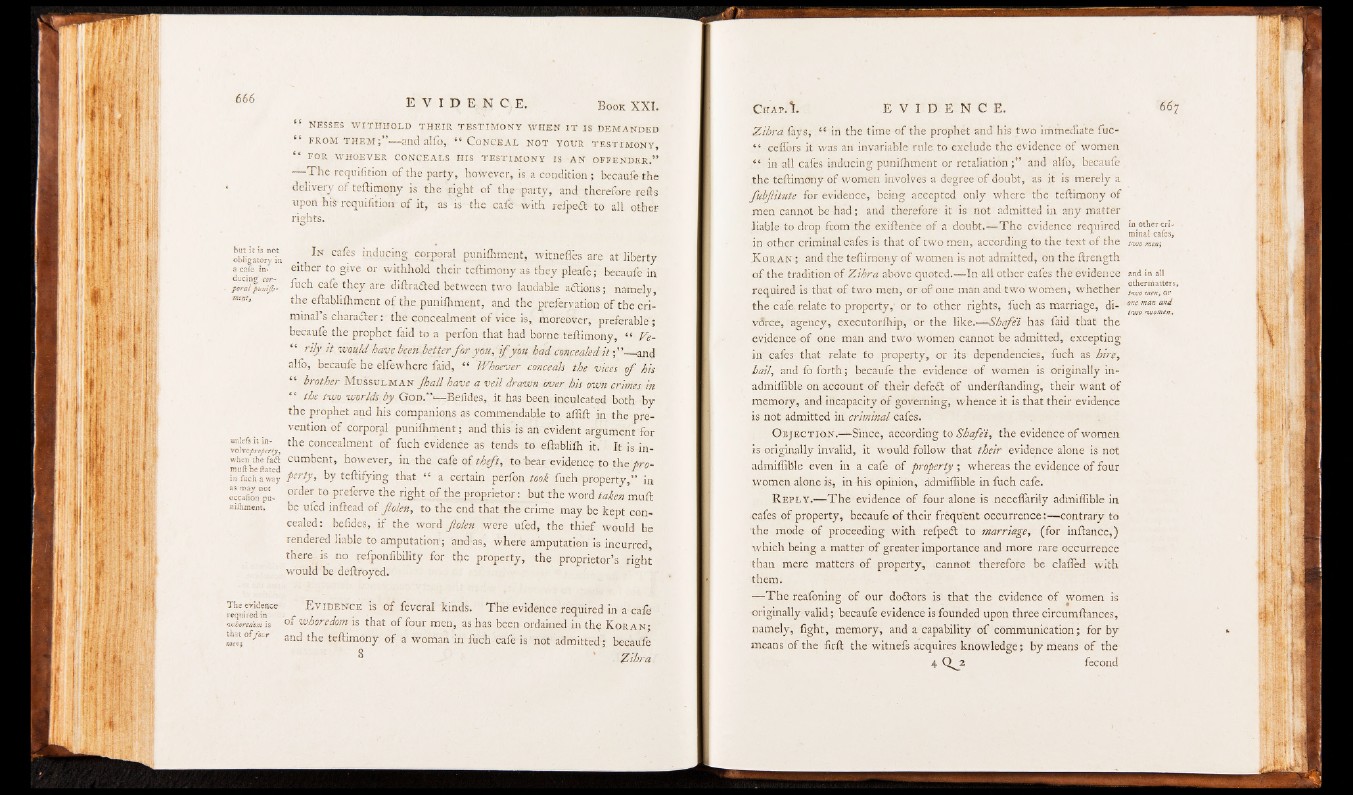
but it is not
obligatory in
a cafe inducing
corpora/
putiijh-
meat,
unlefs it in-
vol veproperfy,
when the fa i l
mull be Hated
in fuch a way
as may not
occafion pu-
nilhment.
T he evidence
required in
•whoredom is
that o ffo u r
meni
“ NESSES w i t h h o l d t h e ir t e s t im o n y w h e n i t i s d e m a n d e d
“ f r o m t h e m ; ”— and alio, “ C o n c e a l n o t y o u r t e s t im o n y ,
“ F°R w h o e v e r c o n c e a l s h i s t e s t im o n y is -a n o f f e n d e r . ”
— The requifition of the party, however, is a condition ; becaufe the
delivery of teftimony is the sight of the party, and therefore reds
upon his requifition of it, as is the cafe with refpeft to all other
rights.
In cafes inducing corporal punifhment, witnefles are at'liberty
either to give or withhold their teftimony as they pleafe; becaufe in
fuch cafe they are diftrafled between two laudable aftions;, namely,
the eftabliihment of the puniftiment, and the prefervation of the criminal’s
character: the concealment of vice is, moreover, preferable;
becaufe the prophet faid to a perfon that had borne teftimony, “ Ve-
“ rily it would have been better fo r you, i f you had con cea led i t ;”_and
alfo, becaufe he elfewhere faid, “ Whoever conceals the vices o f his
“ brother M u s s u l m a n Jhall have a veil drawn over his own crimes in
“ two worlds by G od.” — Befides.,. it has been inculcated both -by
the prophet and his companions as commendable to afiift in the prevention
of corporal punilhment; and this’is an evident argument for
the concealment of fuch evidence as tends to eftablilh it. It is incumbent,
however, in the cafe of theft, to bearevidence to the property,
by teftifying that “ a certain perfon took fuch property,” in
order to preferve the right of the proprietor: but the word taken muft
be ufed inftead of fioleit, to the end that the crime may be kept concealed:
befides, i f the word Jlolen were ufed, the thief would be
rendered liable to amputation ; and as, where amputation is incurred,
there is no refponfibility for the property, the proprietor’s right
would be deftroyed.
E vidence is of feveral kinds. The evidence required in a cafe
of whoredom \% that of four men, as has been ordained in the K oran;
and the teftimony of a woman in fuch cafe is not admitted; becaufe
^ ' Zihra.
Zihra lays, “ in the time of the prophet and his two immediate fuc-
“ ceii’ors it was an invariable rule to exclude the evidence of women
“ in all cafes inducing punilhment or retaliation;” and alfo, becaufe,
the teftimony of women involves a degree of doubt, as it is merely a
fu b f itute for evidence, being accepted only where the teftimony of
men cannot be had; and therefore it is not admitted in any matter
liable to drop from the exiftence of a doubt.— The evidence required in o th e r c r i-
. . A minal cafes,
in other criminal cales is that of two men, according to the text of the two men;
K o r a n ; and the teftimony of women is not admitted, on the ftrength
of the tradition of Zihra above quoted.— In all other cafes the evidence and in all
required is that of two men, or of one man and two women, whether ,women,or '
the cafe, relate to property,1 or to other rights, fuch c r y 5 o ’ as marriage, di- mtweo m waonm BeEn,
v5rce, agency, executorlhip, or the like.— Shafe'i has faid that the
evidence of one man and two women cannot be admitted, excepting
in cafes that relate to property, or its dependencies, fuch as hire,
bail, and fo forth; becaufe the evidence of women is originally in-
admilfible on account of their defeft of underftanding, their want of
memory, and incapacity of governing, whence it is that their evidence
is not admitted in criminal cafes.
O b j e c t io n .— Since, according to Shafe'i, the evidence o f women
is originally invalid, it would follow that their evidence alone is not
admiflible even in a cafe of property ; whereas the evidence of four
women alone is, in his opinion, admiflible in fuch cafe.
R e p l y .— The evidence of four alone is neceflarily admiflible in
cafes of property, becaufe of their frequ'ent occurrence :— contrary to
the mode of proceeding with refpedt to marriage, (for inftance,)
which being a matter of greater importance and more rare occurrence
than mere matters of property, cannot therefore be clafled with
them.
— The reafoning of our doftors is' that the evidence of women is' •
originally valid; becaufe evidence is founded upon three circumftances,
namely, fight, memory, and a capability of communication; for by
means of the firfl: the witnefs acquires knowledge; by means of the
4 0 ^ fecond